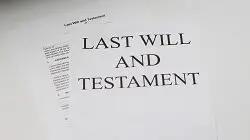Estate planning is often a topic people want to avoid. It is one that forces us to face our mortality head on and plan for that inevitable time when we will not be here anymore. As much as we want to avoid it, the subject must be discussed to set up what will happen to the assets and the people we leave behind. Planning now can give you the peace of mind that upon incapacitation or at death, everything will be set up properly for a smooth transition of assets to your intended beneficiaries.
Important Documents for Estate Planning
Key documents in a sound estate plan are a health care proxy, living will, and power of attorney, which are all in effect while you are living, and a last will and testament to control asset distribution at death. For many, the estate plan will also include a trust.
Advance Directives
The health care proxy and living will are referred to as “advance directives.” These are documents that direct your health care decisions if you become unable to do so yourself. The health care proxy names a person to make decisions on your behalf and the living will directs the decisions you want that person to make when you are at the end of your life.
Power of Attorney
A power of attorney is similar, but on the business and financial side of your life. It is a document that names who can access your bank accounts, sell real estate, transfer assets, and perform other actions that are specifically enumerated as powers in the document. Not all powers of attorney are the same, so it is important to have legal advice when deciding to sign a power of attorney.
Last Will and Testament
A last will and testament, often referred to as a “will,” is a document that states who will be in charge of your estate, this is the executor, and how your assets will be distributed. One of the most common misconceptions in the estate planning world is that a plan that revolves around distribution of assets pursuant to a will can avoid probate … this is simply not true.
What is Probate?
Probate is the process of the Surrogates Court validating the will so that it can be followed, and the executor can be appointed by the Court. It is the process by which your legal next of kin can have an opportunity to object to the will or the appointment of the nominated executor.
Wills control all assets in the deceased person’s sole name that do not have a beneficiary. Let’s assume someone died with a checking account in their sole name and a Traditional IRA with named beneficiaries; in that case, the will would be probated for the distribution of that checking account only, the IRA would be distributed to the beneficiaries on file with the institution. If you add in a piece of real property, such as a primary residence or second home, those assets would also go though probate if the deceased person is the sole owner listed on the deed.
Creating a Trust to Avoid Probate
Another way to avoid probate is with the creation of a trust. While there are many kinds of trusts with varying objectives that all serve the purpose of avoiding probate, a revocable trust is the most common when probate avoidance is the only goal of the planning. A revocable trust is a document that creates a legal entity and lays out the rules of how it will be governed. The key element of the trust is that assets must be transferred into the name of the trust, this is what avoids probate. Using the example above, if the deceased person had created a trust while living, signed a deed transferring the real property into the name of the trust, and gone to the bank to put the checking account into the name of the trust, probate would have been totally avoided.
Varying life circumstances will impact your plan. A plan is directed by the amount of assets you have, the type of assets, who you determine to be the intended beneficiaries, and your family structure. Planning ensures that regardless of these factors, your estate can be handled efficiently and according to your wishes.
Author: Britt Burner, Esq. is a Partner at Burner Prudenti Law, P.C. focusing her practice areas on Estate Planning and Elder Law.








